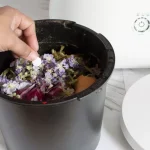From a one-handed cutting board to a talking scale, they’re a boon to anybody with limited mobility or low vision
There is an array of clever kitchen tools out there designed to make cooking safer and easier for people with low vision or limited mobility. These items can be incredibly useful in the kitchen, solving difficulties that cooks of all kinds experience. But these aren’t necessarily gadgets you see on the shelf at every supermarket, so you might not have known they existed—even if they’re designed specifically for you.
With limited mobility in one hand, using a knife can be a tough proposition. Designed for one-handed cutting, this heavy-duty polypropylene board has spikes in one corner that you can use to anchor whatever you’re slicing, as well as suction cups on the bottom to help keep it firmly in place on the counter or tabletop. The other corner has a pair of “walls” that are useful for tasks like spreading butter on toast, cream cheese on a bagel, or condiments on a sandwich. The board is a decent if not enormous size at 12 inches square, and it’s dishwasher-safe for easy cleanup.
A crescent-shaped rocker knife like this one is great for easy one-handed slicing and chopping. The handle is centered over the cutting surface, which means the blade itself helps hold up your hand and arm while you use it. There are lots of options out there for rocker knives, not always sold specifically as adaptive tools: This same kind of knife might also be called a pizza cutter, mezzaluna (Italian for “half-moon”), or ulu knife (after a similar style of knife used by Indigenous Alaskans).
“Look for a rocker knife that has a large, rubber handle with a longer-length blade so that there is more leverage and it supports a weaker grasp,” says licensed occupational therapist Dr. Brooke Murtaugh, OTD, OTR/L, CBIST, BT-C. “Price doesn’t matter. Cheaper ones are just as good.” This Kiessco model is inexpensive, with an anti-slip handle and nice long blade.
For someone with hand tremors or low vision, this inexpensive tool makes cutting safer. The guard slips around two fingers like a pair of rings and lets you manipulate food with your off hand while the steel shield protects it from accidental knife slips. For this set’s low price, you actually get two identical guards, both of which are dishwasher-safe and will work on the left or right hand.
Whether for shucking oysters, filleting fish, or using a mandoline, a pair of cut-resistant gloves is a good idea for any cook. These gloves are also an excellent adaptive tool, offering confidence with a knife for anyone with vision or movement issues. NoCry says these gloves are four times as cut-resistant as leather, and they’re made with a lightweight, breathable fabric that offers more dexterity than stiff, thick leather.
Better yet, the thumb and first two fingers have stainless steel thread in them, making them touchscreen-compatible. You can scroll to the next step in the recipe, change the music, or take a photo of your creations without needing to take the gloves off. (Note that this link goes to the medium gloves, but they’re available from extra-small to extra-large for the same price. Make sure to choose the right size for you!)
Tongs give you a secure grip on hot foods, but they can only grip onto a comparatively limited area. A spatula’s great for sliding under and flipping larger items, but it’s not a great way to hold onto small things. This set of locking tongs gives you the best of both worlds, with a pair of heatproof silicone spatulas on the ends of the hinged arms. For someone with limited hand or arm motion, they make it easier to flip or grasp and turn with one hand. This inexpensive set includes one 9-inch and one 12-inch pair of spatula-tongs.
A traditional Y-shaped or straight peeler can be tough to grip for someone with limited mobility, and with both a sharp blade and slippery produce involved, that could be a recipe for injury. This solution to the problem slips over two fingers to attach the blade securely to the palm of your hand. Along with a one-handed cutting board like the one above, a palm peeler makes it easy to deal with any fruit or veggie one-handed. This set includes two peelers—one orange and one green—so you’re not out of luck if one’s in the dishwasher.
When it comes to oven mitts, cookbook author and The Spruce Eats writer Irvin Lin says that his favorites—for any cook—aren’t oven mitts at all. Designed for the incredibly high temperatures of welding, these gloves can handle temperatures well beyond anything you might encounter while cooking.
The individual fingers also make it much easier to grasp and maneuver objects than the mitten-like shape of most oven mitts, and the grippy leather texture on the fingers and palms is better at holding sheet pans or pot handles than sometimes-slippery silicone. With a maximum temperature capacity of 2,360 degrees, these gloves could pick up grates off the hot grill or even just grab a red-hot coal straight out of the fire with no problems.
:max_bytes(150000):strip_icc():format(webp)/ses-product-rapicca-welding-gloves-irvin-lin-02.jpg-761cc9141a354678aaa58a1c44d37339.jpg)
A jar lid that just won’t open is one of the most frustrating things that can happen to any cook. And if you have limited mobility or strength in your hands, the problem is even more frustrating—and frequent. This one-handed solution has a V-shaped set of grippers to hold any size lid securely while you twist the jar loose, from a tiny container of capers to a huge jar of whole dill pickles. It mounts underneath a cabinet, with either a peel-and-stick adhesive sheet or a set of more permanent screws, both of which are included.
For someone with low or no vision, this simple tool is indispensable. It clips over the edge of a mug, glass, or any other container and beeps when the liquid reaches the level of the metal probes to let you know it’s getting full. Then, as you continue pouring more slowly, the tone changes to indicate the liquid is almost to the top. It’s useful to prevent spills—especially of hot tea or coffee—as well as with filling liquid measuring cups. The Braille Store’s indicator takes two AAA batteries, which aren’t included.
A scale that simply speaks out the weight that it’s reading is a really useful tool for the low-vision cook. This one has modes for both dry weights and liquid volumes. The voice is a clear North American accent, that articulates the measurement and unit quickly after placing your ingredients on the scale. It’s also on the louder side, so everyone in the kitchen should be able to hear it.
If a spork is a combination spoon and fork, a knork is a combination knife and fork. That’s the basis of this unique utensil: The wide, curved tines on either side have an edge that can cut through meats, firm veggies, and other foods with which you’d normally need a separate knife. The design’s great for one-handed eaters, as well as kids who aren’t old enough to use a steak knife just yet, and the symmetrical layout means the knork will work for left- or right-handed diners. This set is simply four forks, but the Knork brand makes a wide variety of flatware, all of its forks offering the signature cutting edge.
These little stickers, in a variety of sizes, shapes, and textures, are useful almost anywhere in the home for someone with low vision. In the kitchen, you can use them to mark control buttons on appliances like the oven, microwave, or Instant Pot; distinguish between spices that all come in identically shaped bottles; or to identify various cans and jars in the pantry. This pack includes 106 dots in five varieties, enough to last at least a little while—you might need more than one set, but they’re pretty cheap.
Best Anti-Fatigue Mat
Sky Solutions Sky Mat Comfort Anti-Fatigue Mat
:max_bytes(150000):strip_icc():format(webp)/sky-solutions-sky-mat-comfort-anti-fatigue-mat-00c52d2cf649445f8eb63e1bcfe34351.jpg)
If you have trouble standing for long periods, this simple squishy mat can make a surprising amount of difference for your feet, legs, or back. Standing on a hard, bare floor puts pressure on pretty much the entire lower half of your body that anti-fatigue mats like this one are designed to alleviate. In our testing of kitchen mats, the Sky Mat took the top spot thanks to its thick memory foam and helpful features like a nonslip bottom and beveled edge around the side to help avoid tripping. The Sky Mat is easy to clean with just a rinse, and it’s available in four different sizes and 14 different colors.
:max_bytes(150000):strip_icc():format(webp)/SPRE-SkySolutionsComfort-FredHardy-0462.jpg-0a88809a4f244dd7800fb290cd1e6051.jpg)
Canadian writer, food photographer, and disability advocate Jules Sherred created this book around three tools he found indispensable as a disabled cook: the Instant Pot, air fryer, and bread machine. In addition to recipes for everything from lemon pound cake to Jules’s Effin’ Good Chili, the book includes advice on meal planning, shopping, and kitchen organization for people with all different kinds of access needs. And it does so with heart and a sense of humor.
FAQs
What is an adaptive kitchen tool?
An adaptive tool is anything designed to adapt the environment to a person’s individual needs. In the kitchen, that could mean anything from wheelchair-height sinks, counters, and appliances, to the gadgets in this story. Hand and arm mobility are important for cooking, and many adaptive tools help with performing tasks one-handed or handling hot items safely. Kitchen organization is also especially important for cooks with limited mobility or low vision, and there are many options that help label and arrange tools and ingredients in a more accessible way.
Who are adaptive kitchen tools for?
In essence, anybody who needs help in the kitchen for any reason. “Aging, illness, injury, or disability can make daily homemaking, kitchen tasks, and meal preparation challenging,” says licensed occupational therapist Dr. Brooke Murtaugh, OTD, OTR/L, CBIST, BT-C. She heads up the brain injury program at Madonna Rehabilitation Hospitals in Lincoln, Nebraska, helping patients work with their disabilities and find different ways to engage with the world around them. “Adapting the kitchen for accessibility is important for maintaining independence in the home.”
How can I make my kitchen more accessible?
In addition to the items above, “a multitude of products and adaptations are available for the home,” Murtaugh says. This can be as simple as reorganizing the kitchen, keeping frequently used items and ingredients on the counter instead of a cabinet that requires reaching up or bending down to access. High-contrast colors can also help for people with low vision: Murtaugh suggests looking for measuring cups and spoons with bright color-coded handles and using a white placemat or cutting board to prepare darker-colored foods so they will be easier to see.
She also suggests getting professional assistance if you have an issue interfering with your cooking. Each person’s needs are different, as are the best solutions for them. “To identify what tools and adaptations would promote independence, seek out an occupational therapist in your community. They are specially trained to adapt your home and daily life to your needs to support your long-term independence.”


:max_bytes(150000):strip_icc():format(webp)/keissco-d7b8525665b547a59e30acd0a468ea02.jpg)
:max_bytes(150000):strip_icc():format(webp)/fingerguard-8a329526f6f74d84b479d75ec56321c7.jpg)
:max_bytes(150000):strip_icc():format(webp)/81PFP6gsUuL._AC_SL1500_-d6b5cb7ddd1946a695487ad59b6e98a6.jpg)
:max_bytes(150000):strip_icc():format(webp)/staruby-fad57ee05a5f4da98d4d7a668f20b4ba.jpg)
:max_bytes(150000):strip_icc():format(webp)/palmpeeler-a9ce17d3082542c7bcb7fe3fef04942a.jpg)
:max_bytes(150000):strip_icc():format(webp)/Rapicca-Welding-Gloves-55d20f32ced948da98825e59a5db3f8b.jpg)
:max_bytes(150000):strip_icc():format(webp)/EZ-Off-Easy-Grip-One-Handed-Jar-Opener-d40896d14b104563933dd297f5ff17f2.jpg)
:max_bytes(150000):strip_icc():format(webp)/braille-9cccd719db51480ba618dbf41033a090.jpg)
:max_bytes(150000):strip_icc():format(webp)/Cirbic-Talking-Kitchen-Scale-53dfb183be7e4ea68aba23e5db7d8331.jpg)
:max_bytes(150000):strip_icc():format(webp)/knork-dd59abdb44ea48658b30c436ef821c66.jpg)
:max_bytes(150000):strip_icc():format(webp)/bumpdots-e441d5cc7310444697a1168fe0d37d8c.jpg)
:max_bytes(150000):strip_icc():format(webp)/71UH3WWt56L-b285709ab0d94fc7a00649327c540ee0.jpg)

